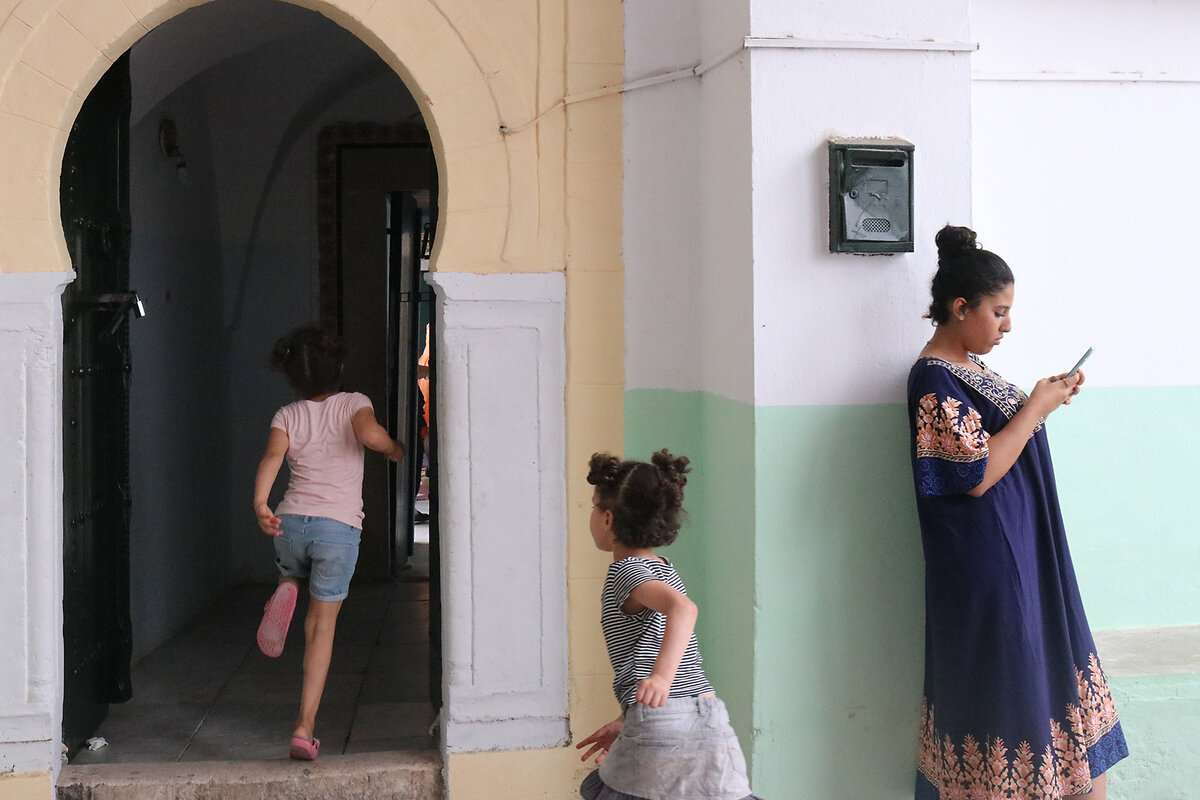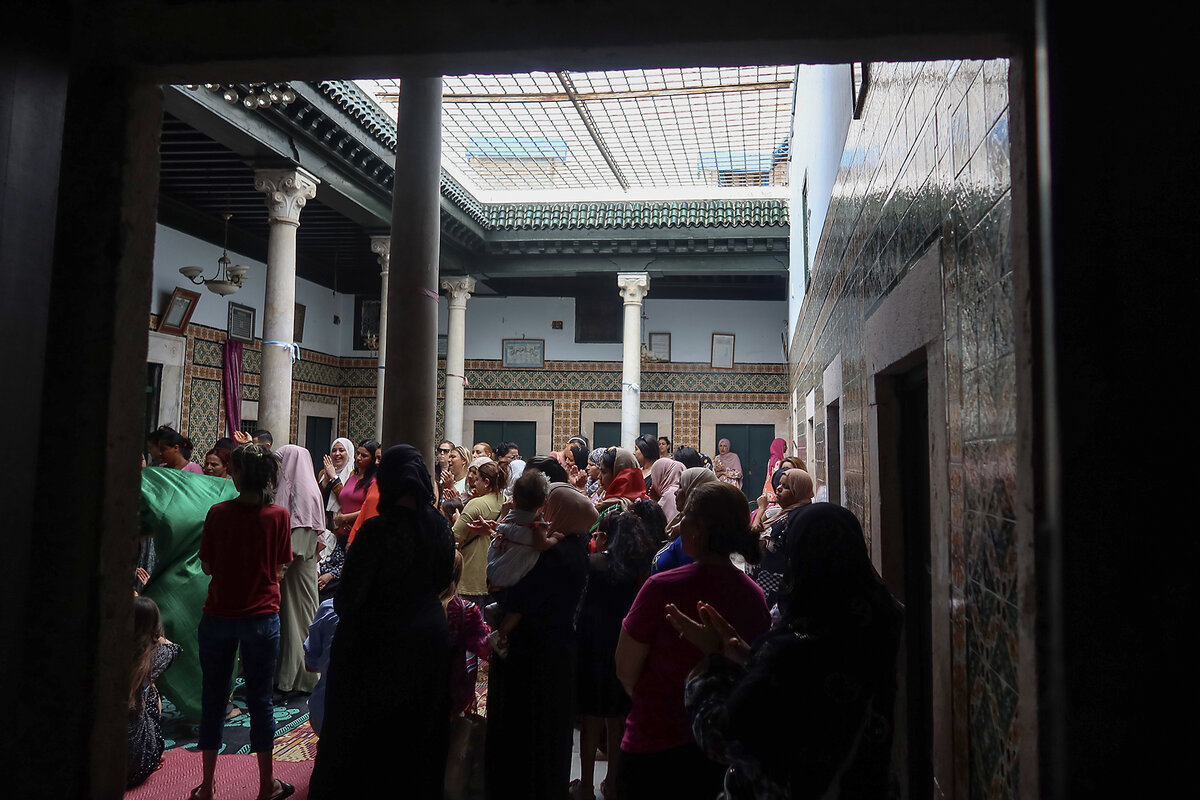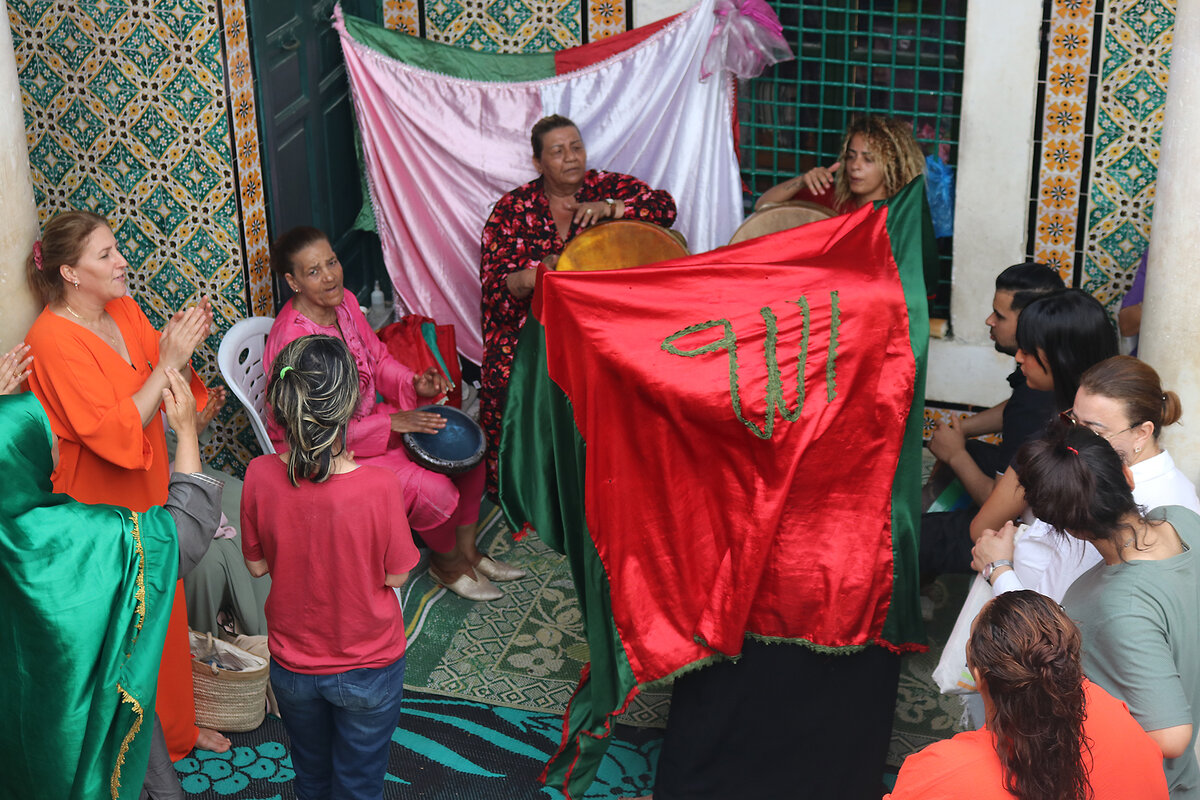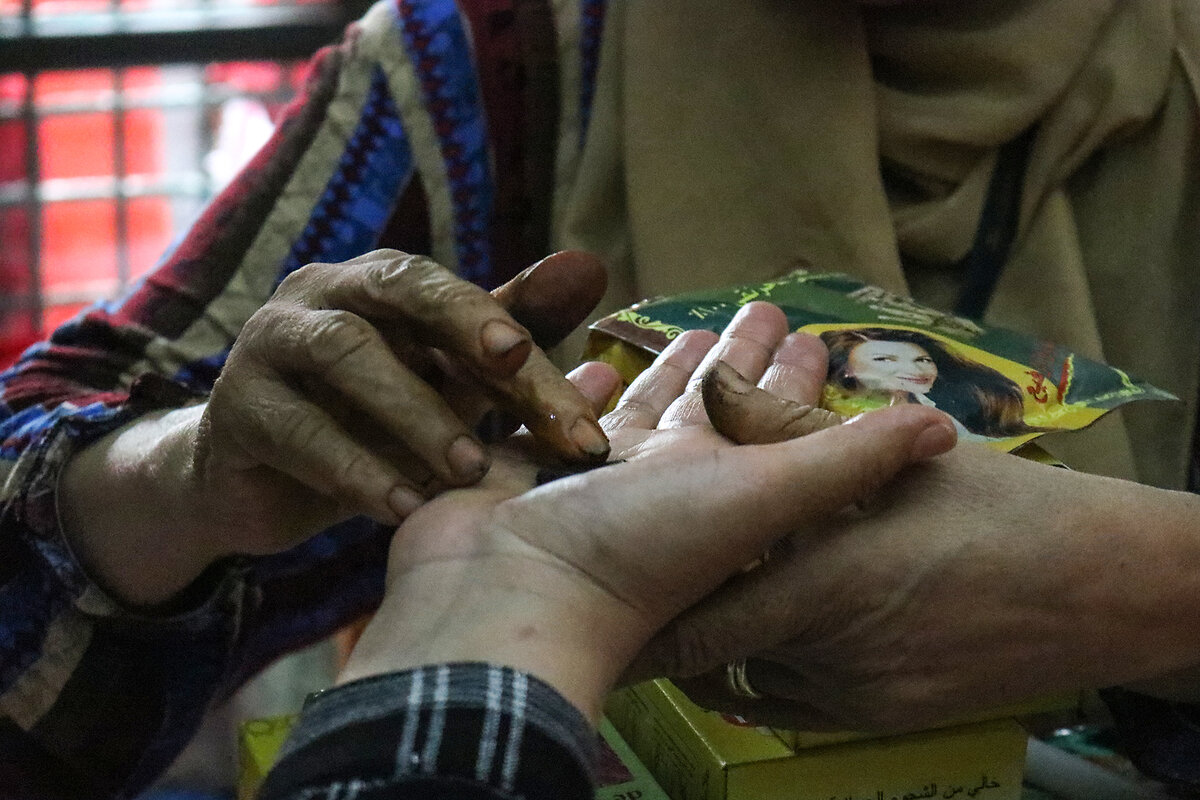In Tunisia, a Sufi shrine with an exuberant feminist vibe
Loading...
| Manouba, Tunisia
Faster and faster, the drums beat, the cymbals clang, the women chant.
Feverishly, the visitors to this Islamic shrine wave their arms, gyrate their hips, whip their heads, and tap their feet – letting loose, letting free, as if no one in the world is watching.
This is no dance festival. At Sayyida Manoubia, a Tunisian shrine commemorating a 13th-century scholar and saint of that name who was praised for her charity, visitors are encouraged to unpack their stresses, leave behind their worries, and wish their deepest wishes.
Why We Wrote This
It is said that Sayyida Manoubia, a Sufi saint, refused to marry, concerned it would interfere with her charity and pursuit of heavenly truths. Which is why, perhaps oddly, her shrine is now a must-stop for Tunisian would-be, soon-to-be, and longtime brides.
“Here we can share our secrets and be ourselves,” says longtime regular visitor Salwa Sayeda.
While other Sufi shrines across North Africa are frequented by groups of men chanting the names of God and praying, the scene at Sayyida Manoubia is almost exclusively an all-women affair.
Every Sunday thousands of women from across Tunisia walk through an hourglass-shaped wooden door into the shrine, tucked away on a side street near Razi Hospital in the Tunis suburb of Manouba.
Upon entering, visitors are embraced by a festival of prayer and womanhood.
A band stationed in the corner of the courtyard keeps up the tempo, encouraging shrinegoers to sing for God and for each other. Outside, women sell nuts, candies, and water for worshippers who come to spend the entire afternoon or simply a few minutes to make a wish.
“Please help me, Sayyida Manoubia,” a visitor says as she steps into the shrine’s inner chamber, “and bless everyone.”
Sayyida Manoubia
At the turn of the 13th century, under the Hafsid dynasty that then ruled North Africa, Sayyida Manoubia was born Aicha al-Manoubi to a merchant family in a rural area outside Tunis.
A talented seamstress and wool-weaver, she became known for distributing wool clothes to disadvantaged people in her town.
She later came under the tutelage of Abu al-Hasan al-Shadhili, a prominent Islamic scholar and leading Sufi thinker, and became one of 40 disciples who spread his mystical Islamic teachings throughout North Africa.
Sayyida Manoubia was recognized as a saint, both for her charity work and for her religious studies, and is one of the few female saints in Islam.
The veneration of saints was once widespread in Islam but is now discouraged in large swaths of the Sunni world. In North Africa, where Sufism remains a strong current, such celebrations remain staples of daily life.
According to oral history, Sayyida Manoubia became so influential that the Hafsid rulers consulted her on matters of state, making use of her judgement and considerable influence to shape policy.
For feminists, a revolutionary
The shrine honoring Sayyida Manoubia was established at her childhood home centuries ago.
Today Sayyida Manoubia is a patron saint both to the devout and to Tunisian feminists who see her as a revolutionary who pursued higher education and religious authority at a time when such opportunities for women were restricted.
Devoted to good works, prayer, and the study of Islam, Sayyida Manoubia, it is said, refused dozens of offers of marriage, concerned that a domestic life would interfere with her charitable work and pursuit of heavenly truths. She died at the age of 76, never having married.
Which is why, perhaps oddly, her shrine is now a must-stop for Tunisian would-be, soon-to-be, and longtime brides.
On a Sunday in June, Thakra, age 25, who previously came to the shrine with a friend praying for a job, carefully lights a candle and places it in a tiny grotto in a wall above the spot where tradition holds that Sayyida Manoubia was born. (Thakra, like some others interviewed, gave only her first name.)
Her request? A fiancé.
“We all grew up knowing Sayyida Manoubia was a good person who helped people in need,” Thakra says as she walks past a wall scrawled with visitors’ prayers and wishes. “We come here to ask her to help us women in our times of need.”
She smiles, shyly. “I want a fiancé.”
Thakra barely finishes her sentence when a clamoring wedding party, one of dozens that would come through that day, surges into the inner shrine, singing, clapping, and ululating.
A soon-to-be bride dances into a room that once housed Sayyida Manoubia’s tomb, where a volunteer places a small disc of henna dye into her right palm as a blessing. Dozens of her bridesmaids line up behind her for the same blessing.
Outside in the courtyard, Hibba, a Tunis resident, wraps herself in a silk shroud and spins and twirls as her bridal party and dozens of visitors cheer and clap.
“It is an amazing feeling to have all these strangers share in my joy. It’s a high,” says Hibba, planning to marry in one week. “This shrine is a chance for us women to cheer on one another and share in one another’s happiness.”
“And support one another in our times of sadness,” adds one of her friends.
Social club’s vibe
Even for the nonreligious, a visit to the Sayyida Manoubia shrine has become an important, and very vibrant, part of wedding celebrations, to bless brides for their new married life – with steady jobs, a house, children, and success.
Others come for psychological and social support, with a resident amateur therapist and healer on hand to provide advice and guidance to women facing struggles and “personal crises.”
With regulars mixing with wedding parties and women feeling down on their luck, the shrine has the relaxed vibes of a social club, a neighborhood watercooler, and group therapy.
“I raised seven children at home,” says Ms. Sayeda, the veteran shrinegoer, who has come here weekly for 30 years and has watched people “grow up” at the shrine. “Anytime I feel stressed or that the world is getting too much, I hop into a taxi and head here.
“When I am sick, I come here for healing. When I am tired, I come here for rest. This place is complete serenity and relaxation. It puts me at ease and refreshes my soul.”
Charity
But it is not all dancing and healing at this Islamic shrine; generosity and charity are still very much present.
On this day, like every day, visitors carry containers and pots of couscous and chicken to feed disadvantaged Tunisians. Many of the neighborhood’s poorest residents come here for their daily meal.
The shrine also offers free housing and food for out-of-town patients receiving treatment at the next-door government hospital, acting as a traveler’s rest house just as the shrine did when it was first established.
“Everyone talks about women’s rights today, but people’s veneration of Sayyida Manoubia is proof that there were women’s rights in the early days of Islam,” says Mohammed Salah Yaqoubi, the shrine’s caretaker, a role he inherited from his parents in 1987. “The good deeds that continue today show how influential women can be.”
“Here we have the freedom to unveil our true selves and commune with God,” Ms. Sayeda adds. “This is a place to remember that with God, and with each other, we women are never alone.”










